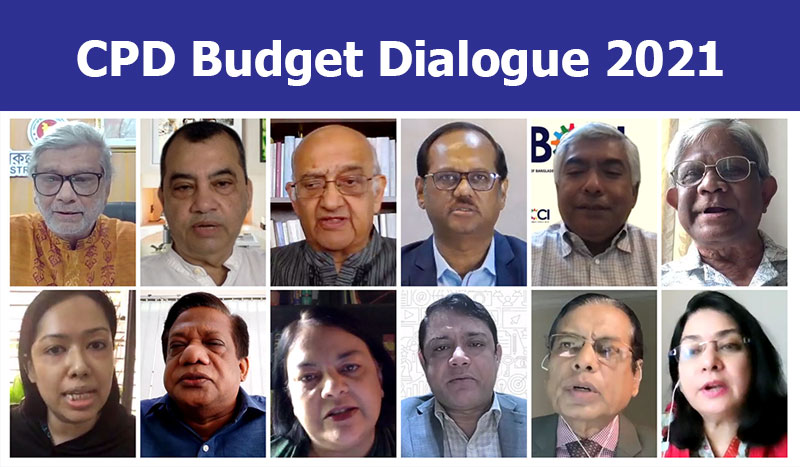The National Budget for FY2021-22 document refers to management of the COVID situation throughout, which was not there in the budget for FY21. However, the document does not have much to offer in terms of concrete measures and adequate resources to combat COVID-induced challenges. In the budget speech it is mentioned that health, agriculture and employment generation have been given priority while allocating resources for the Annual Development Plan (ADP). However, actual allocation does not reflect this as these promises have not been supported by the required resources. Moreover, the budget does not seem to recognise the implementation challenges and hence does not spell out ways to overcome those challenges. Nothing has been mentioned regarding capacity development, stronger monitoring and evaluation, results based framework etc. for better implementation of budgetary proposals. These observations emerged at the CPD’s Virtual Budget Dialogue 2021. The dialogue was held on Saturday, 12 June 2021.

Dr Fahmida Khatun, Executive Director, CPD made the keynote presentation titled, “An Analysis of the National Budget for FY2021-22”. She presented that the macroeconomic framework of the budget is far from reality. It takes the revised targets of budget for FY21, as reference points and assumes that most of the macroeconomic correlates would perform better than the targets set in 8FYP. However the targets are unlikely to be achieved. Though there is a section on reforms in the budget document, it only refers to what have been done so far. It does not spell out what concrete reforms would be undertaken to improve the efficiency in the economy. The unfinished reform agenda in many areas such as tax, customs duty, banking sector, health sector and social sector has constrained the achievement of budgetary targets and its ability to cope with adverse impacts of the pandemic. Given the magnitude of negative impact on various sectors due to COVID-19, CPD had emphasised on the need for medium term strategy for economic recovery. The budget for FY22 has no indication on this. This risks the fulfillment of the promise made in the 50th budget to move towards a resilient future by giving priority to lives and livelihoods.
Mr M A Mannan, MP, Hon’ble Minister for Planning, Government of Bangladesh was present as the Chief Guest at the dialogue. He stated that data is a fundamental requirement for policy making and mentioned to focus more on strengthening of institutions for preparing data. In his statement, the Hon’ble Minister also mentioned that it is the responsibility of the business institutions to collect and submit VAT and assist the government in its revenue collection efforts. Mr M A Mannan, MP shared his opinion of having a capped system for remittance incentive by the government to motivate and support remittance senders.
The Guest of Honour at the dialogue, Mr Saber Hossain Chowdhury, MP, Honorary President, Inter-Parliamentary Union (IPU) and Chairman, Parliamentary Standing Committee on Ministry of Environment, Forest and Climate Change stated that the COVID-19 pandemic must be tackled with a public health response by focusing on the prevention of the disease. Answering to a question by the Chair of the session, Professor Rehman Sobhan, Chairman, CPD, Mr Saber Hossain Chowdhury, MP mentioned that the pre-budget consultation with the policymakers need to be more inclusive and the decision making process needs to be more data driven.
Professor Rehman Sobhan questioned on how the budget is implemented so much near the end of the fiscal year even in a pandemic year. He opined that larger public expenditures must be made for building health facilities. Professor Sobhan continued on how low rates of COVID testing and vaccination would impact development process to gain pace. He further proposed trying out an unemployment insurance mechanism system in the RMG sector, which could be later used universally. For the migrant workers, he stated that their return to work place should be the responsibility of the government. The major responsibility of job creation is of the government, said Professor Sobhan. There should be a government initiated employment creating intervention. Furthermore, he added that the government agencies should have provided poverty data by now.
Five Distinguished Panelists also shared their views at the dialogue. Dr Salehuddin Ahmed, Former Governor, Bangladesh Bank opined that the budget lacks initiatives to support the left behind poor people. The budget also did not mention much about necessary structural reformation, he added. Speaking of the decrease in Corporate Income Tax, Barrister Nihad Kabir, President, Metropolitan Chamber of Commerce and Industry (MCCI) said that such measures are necessary initiative but not sufficient. She called for widening tax net to increase the tax-GDP ratio. Adding to this, Mr Md. Jashim Uddin, President, Federation of Bangladesh Chambers of Commerce & Industries (FBCCI) stated that sectoral and item-wise taxation policies can be initiated instead of universal tax policies. Mr Mirza Nurul Ghani Shovon, President, Central Executive Committee, National Association of Small and Cottage Industries of Bangladesh (NASCIB) said that capacity building, access to information and access to market are the major challenges of the SMEs in addition to the financial challenges.
Professor Mustafizur Rahman, Distinguished Fellow moderated the session. He initiated the dialogue by mentioning how lack of data is causing weak assumptions in policy making. Professor Rahman also requested the participants to focus on what the budget has for the RMG sector, remittance earners and the agriculture sector.
The dialogue was attended by high-level policy makers, political leaders, academics, development practitioners, business leaders, civil society activists, international development partners and journalists among others.


